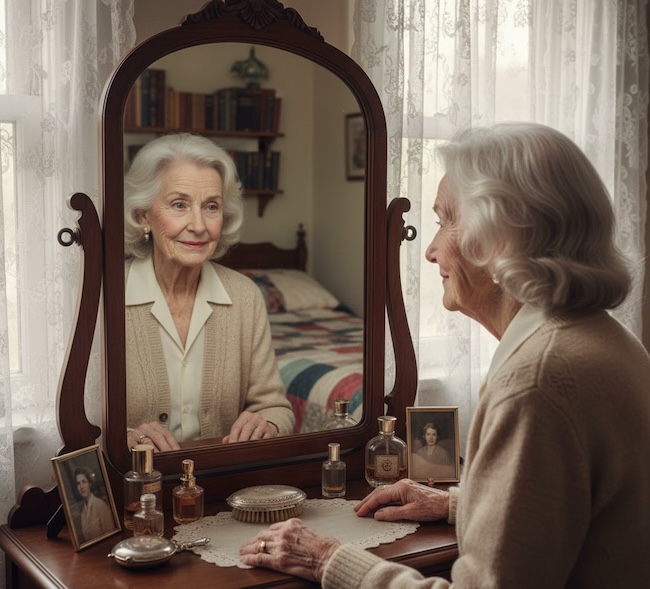Mirrors can be a surprising source of distress for people with dementia, often causing confusion or agitation when they no longer recognize their reflection. These reactions can be unsettling for both seniors and caregivers, but with the right strategies, you can minimize discomfort and create a calmer environment.
In this article, we share 10 practical solutions to help manage mirror-related challenges—from simple adjustments to dementia-friendly alternatives. Discover how small changes can make a big difference in your loved one’s well-being.

Dementia and Mirrors Can Be a Terrifying Combination
Did you know that mirrors can be very disturbing for someone with Alzheimer's disease or dementia?
For some, seeing their reflection in a mirror can cause anxiety, anger, or even hysterical terror.
If your older adult suddenly becomes distressed or irrational without any clear triggers, look around the room for mirrors or reflective surfaces.
Differences in lighting could also accidentally create a mirror effect. For example, at night, an uncovered window appears to be a mirror because the inside of the house is brightly lit, while the outside is dark.
We explain why mirrors and dementia can cause problems and share 10 creative ideas for covering mirrors to eliminate them as sources of fear and anxiety in dementia.
VIDEO: Why Are Mirrors So Scary for People with Dementia?
Why are Dementia and Mirrors so Terrifying?
Experts think that people with dementia fear mirrors because they don’t understand that they’re seeing a reflected image of themselves.
They don’t recognize the person they see and think that a stranger has suddenly appeared in their vicinity.
Being startled by this “intruder” can cause them to become so confused and upset that they react completely irrationally. They might resist your attempts to calm them or explain that they’re safe.
A fear of mirrors could also be a reason why some seniors with dementia refuse to bathe or become agitated in the bathroom. They might be afraid because “that stranger” is always present for these personal activities.

10 Solutions for Problems Caused by Dementia and Mirrors
Remove Unnecessary Mirrors from Around the Home
Remove unnecessary mirrors, like those in their room, and any decorative mirrors around the house. If they cannot be easily removed, continue reading for tips on how to cover them.
Close the Blinds and Drapes Before Sunset
Closing all the window drapes and blinds (before the sun sets) can help when a window mimics the reflection of a mirror.
Turn the Mirrors Around So They Aren't Reflective
Turn full-length standing mirrors around to face the wall and only turn them right-side out when needed. Keep the turned-around mirror in a closet or behind an open door to make it even less noticeable.
Cover-up Your Mirrors
Drape a towel or large piece of cloth over wall-mounted mirrors.
Cover the Mirrors with Fabric or Other Materials
Attach adhesive pleated fabric shades to the surface of a mirror to cover it like a window. It looks pretty and works great!
Use Posters to Cover the Mirrors
Cover your mirror with a poster. Sometimes soothing nature scenes like these can be functional and gorgeous.
Use Window Film to Transform Your Mirror into Art
Transform a mirror into beautiful stained glass art with special adhesive window film – these flowers and patterns are lovely.
Remove or Replace Reflective Cabinet Doors
Remove or cover up mirrored medicine cabinet doors. Ensure that any medications or sharp objects are removed if the door is removed and the contents are visible.
Use Contact Paper to Cover Mirrors Around the Home
Cover large mirrors, such as mirrored closet doors, with self-adhesive contact paper in a soothing color and a minimal pattern. Try simple designs, such as white wood panels, light maple wood, or soothing light blue.
Install a Curtain Rod and Cover Large Mirrors on the Wall
Install a curtain rod (like this decorative one) above the mirror and hang curtains to cover it, making it look like a window. Open the drapes anytime you need to use the mirror. Alternatively, use semi-sheer curtains for a lighter look that still effectively hides reflections.
By utilizing these strategies, you can help your loved one minimize the confusion associated with mirrors around the home. Do you have any other strategies we may have missed? Please share them below!
Recommended for you:
- How to Understand and Manage Dementia Behaviors: A Comprehensive Guide
- 4 Benefits of Activities for Dementia and 5 Ways to Adapt Daily Tasks
- 4 Ways to Respond to Repetitive Questions in Dementia
This article contains some affiliate links. We never link to products or services for the sole purpose of making a commission. For more information, see How We Make Money.
About the Author

Connie is the founder of DailyCaring.com and was a hands-on caregiver for her grandmother for 20 years. (Grandma made it to 101 years old!) She knows how challenging, overwhelming, and all-consuming caring for an older adult can be. She also understands the importance of support, especially in the form of practical solutions, valuable resources, and self-care tips.














Hi, I also think they don’t believe it’s them they are looking at. My mom whom unfortunately has passed due to Dementia, used to look at herself in the mirror, touch her face and look at her hands and say, Not me. It’s very sad. I think mentally they may think of themselves as a young person and then when they see themselves in the mirror it becomes stressful to them. You think you’re young and there’s this old person looking back at you. It’s a terribly sad disease. I wish everyone out there the best, while looking after your loved ones with this disease. It takes both physical and mental strength.
All of the things sound good. Try taking care of an mil with Dementia that barely speaks English. She is now trying to talk to her sister(who she thinks she sees). The wheelchair tearing up the walls, her room that smells of pure stench. I am not a caregiver. I have epilepsy. To take care of her, is too much. It isn’t the physical caring. It is the mental cruelty and invasion of my privacy. 7 days a week. My m.d said I was not complaining. It was my brain and body telling me to stop. Yes, I want her to leave. I do not believe it is right to take away a life only to extend the life of someone who has already lived a full life. It is tough
I’m so sorry about the situation. It sounds like it might be good to speak with your spouse about making changes in order to get the necessary help to improve your health and your mother in law’s as well.
My wife is six years into vascular dementia
We’re sad to hear about her dementia 💔 and thank you for sharing your experience 💜
Thank you for sharing. We hope our articles are helpful as you care for your wife.